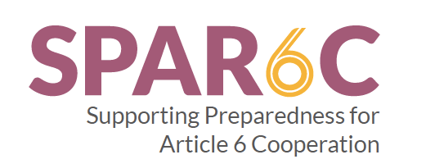In a recent session in Lahore, the Supporting Preparedness for Article 6 Cooperation (SPAR6C) and UNEP Copenhagen Climate Centre engaged students and faculty to discuss the role of research and education in advancing Article 6 frameworks. The session spotlighted the Research Mentorship Programme, which empowers graduate students to contribute to national climate policy through applied research and internships.
In collaboration with the Department of Environmental Sciences at Forman Christian College in Lahore, Pakistan, SPAR6C hosted an awareness session to introduce students and faculty to the concepts of carbon markets, Article 6 of the Paris Agreement, and the emerging opportunities for academic and professional engagement in Pakistan’s climate policy landscape.
The session brought together experts from SPAR6C along with faculty members and students, to discuss how academia can play a central role in supporting Pakistan’s transition toward a low-carbon economy. The event formed part of SPAR6C’s broader effort to raise awareness and strengthen capacity for high-integrity carbon market development through education, research, and mentorship.
A key focus of the session was the Research Mentorship Programme (RMP), a cornerstone of the Community of Practice for Article 6 Implementing Countries (CoP-ASIC). The RMP applies a “learning by doing” approach to research-based capacity building, supporting graduate students in developing policy-relevant research on Article 6 implementation aligned with national priorities. Beyond research, the programme integrates students into the workforce by facilitating paid internships in government, NGOs, and the private sector, helping to build long-term expertise in carbon markets and climate policy within partner countries.
Each year, a new cohort of students from SPAR6C’s four partner countries — Pakistan, Thailand, Colombia, and Zambia, participates in a structured mentorship cycle that includes research supervision from SPAR6C experts, knowledge exchange through global events, and presentation opportunities at international climate forums.
Building the Foundations for Pakistan’s Carbon Market
Dr. Derk Bakker, Chairperson of the Department of Environmental Sciences at Forman Christian College , welcomed the SPAR6C delegation and emphasized the importance of connecting academic research with practical climate action. He noted that universities are uniquely positioned to prepare the next generation of professionals capable of leading Pakistan’s engagement in international climate cooperation while highlighting FCCU’s proactive role in climate education and research.
Dr. Urwah Khan, Advisor on Carbon Markets at UNEP-CCC, introduced the SPAR6C programme and explained its work with the Government of Pakistan to develop Article 6 frameworks and pilot mitigation activities. “Academic institutions can play a powerful role in building the foundation for Pakistan’s carbon market,” said Dr. Khan. “By integrating Article 6 concepts into academic learning and research, we can help create a generation of climate professionals ready to contribute to national and global climate goals.”
Abeera Babar Mahmood, CoP-ASIC Focal Point for Pakistan, shared details about the Research Mentorship Programme and its impact. She explained how the initiative connects students with mentors from SPAR6C’s international network and supports them in applying their research through real-world internships.
“The mentorship programme is helping young researchers in Pakistan turn their academic work into real contributions to climate action,” said Ms. Mahmood. “By linking research to Article 6 of the Paris Agreement, we are preparing the next generation of professionals who will drive Pakistan’s carbon market readiness.”
Next Round of RMP is Open
Ahsan Kamran, Senior Technical Consultant for SPAR6C, led an interactive session on the technical aspects of carbon market project development, explaining core concepts such as baselines, additionality, and monitoring frameworks. The session helped participants understand how these can be integrated into Pakistan’s academic and policy frameworks.
The session concluded with an open discussion between students, faculty, and SPAR6C representatives on how to build academic pathways for climate-focused careers. Faculty members expressed interest in integrating carbon market themes into university curricula and exploring partnerships for joint research and training. Dr. Khan closed the session by encouraging students to apply for the next round of the RMP, noting that academic engagement remains key to building a skilled workforce for Pakistan’s transition to a low-carbon economy.
This initiative also supported SPAR6C’s broader goal of strengthening collaboration under the CoP-ASIC, fostering coordination between governments, academia, and the private sector for inclusive and sustainable climate action.


